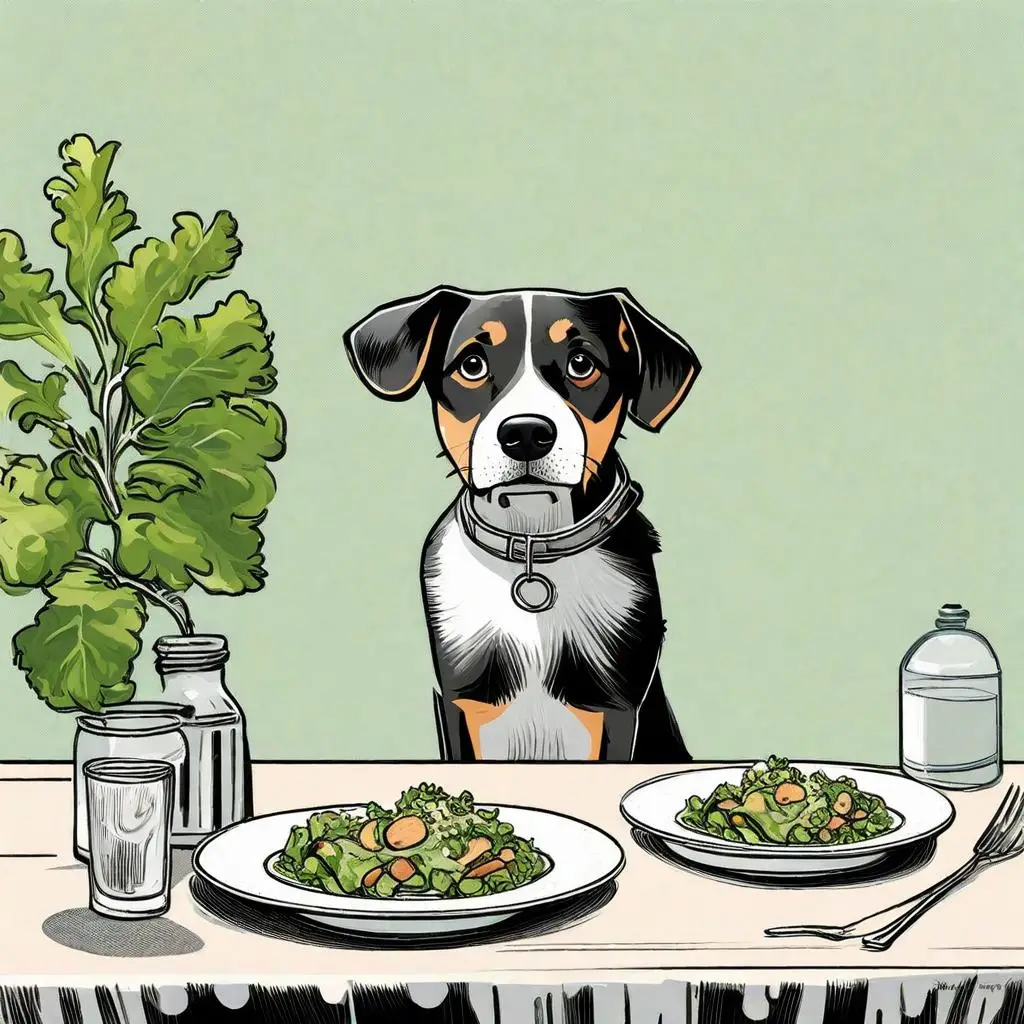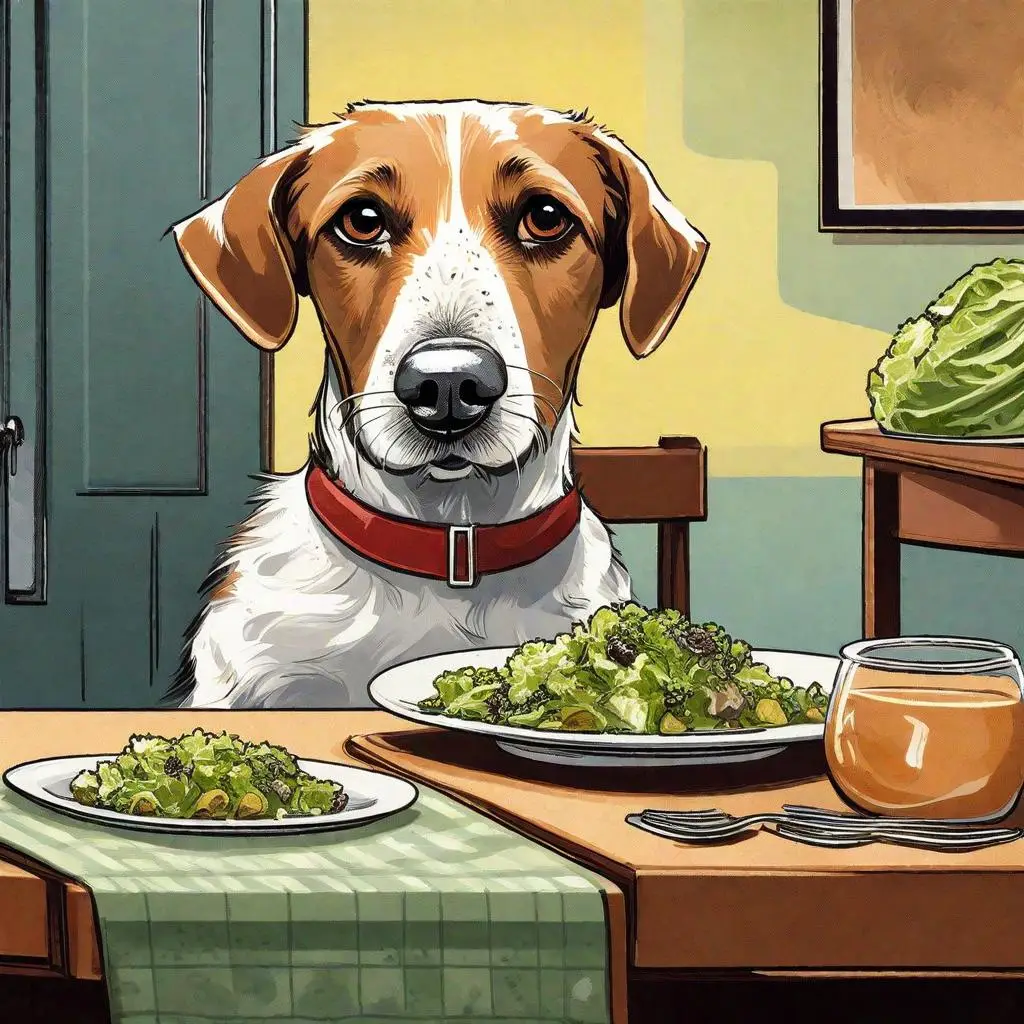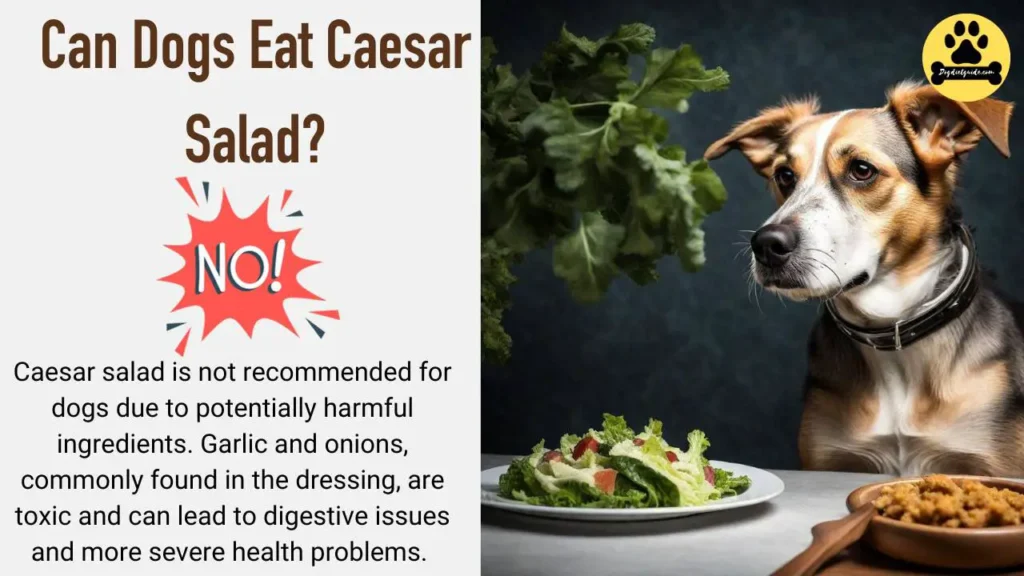Dog Nutritionist Advice: While plain romaine lettuce is generally safe, Caesar salad is not recommended for dogs due to potentially harmful ingredients. Garlic and onions, commonly found in the Caesar dressing, are toxic and can lead to digestive issues and more severe health problems. Other components like croutons, cheese, and anchovies may not offer significant nutritional benefits and could cause digestive discomfort.
As devoted pet owners, we often share our favorite foods with furry friends. The temptation to let them in on our culinary adventures is understandable, especially when faced with a delectable dish like Caesar salad.
Its crisp lettuce, creamy dressing, and flavorful toppings can be hard to resist, but the question remains: can dogs eat Caesar salad? Is it safe for our canine friends to partake in this Caesar salad?
Can Dogs Eat Caesar Salad?

No, Caesar salad contains several ingredients that are not safe for dogs, so it’s generally not recommended to feed it to them. Caesar dressing typically contains ingredients like garlic, anchovies, and sometimes even small amounts of alcohol. These can be harmful to dogs. However, a tiny amount of the salad may not harm your pooch.
Here are some reasons why Caesar salad is not suitable for dogs:
- Romaine Lettuce: While it is not toxic to dogs, it doesn’t provide significant nutritional value for them. It’s better to feed dogs leafy greens that are more nutrient-dense.
- Garlic and Onions: Caesar salad for dogs often contains garlic in the dressing or as a seasoning. Both garlic and onions are highly toxic to dogs, potentially leading to gastrointestinal upset, lethargy, and even more severe health issues, especially if consumed in larger quantities.
- Croutons: These are made from bread, which isn’t toxic to canines but is not particularly beneficial for them. Bread, rich in carbohydrates, can contribute to weight gain and may lead to other health issues if consumed regularly.
- Cheese: While small amounts of cheese are generally not harmful to dogs, some dogs are lactose intolerant, and excessive consumption can lead to digestive issues.
- Anchovies: Caesar salad for dogs dressing often contains anchovies, which are small fish. While small amounts may not be harmful, it’s best to avoid feeding them to canines as they can be high in sodium.
Side Effects of Caesar Dressing for Dogs
- Gastrointestinal Upset (vomiting, diarrhea, abdominal pain)
- Toxicity from Garlic and Onions
- Lethargy and Reduced Energy Levels
- Hemolytic Anemia (destruction of red blood cells)
- Digestive Distress from Croutons and Cheese
- Elevated Sodium Levels from Anchovies
Related Post: At What Age Can A Puppy Eat Dog Food?
What Should I Do If My Dog Eat Caesar Salad?
If your furry friend has consumed Caesar salad, taking action promptly is important. Follow these steps:
- Stay Calm: First, try to stay calm. Panicking can make the situation more stressful for both you and your dog.
- Assess the Situation: Take note of what ingredients your puppy may have ingested. Pay particular attention to garlic, onions, and any other potentially harmful components.
- Contact a veterinarian: Call your veterinarian or an emergency animal poison control hotline immediately. Provide them with details about what your dog ate, the approximate quantity, and your dog’s size and weight.
- Observe Your Dog: Keep a close eye on your pooch for any signs of distress or unusual behavior. Look for symptoms like vomiting, diarrhea, lethargy, or abdominal pain.
- Follow Professional Advice: Your veterinarian or animal poison control expert will give you specific instructions based on your provided information. Follow their advice carefully.
- Do Not Induce Vomiting Without Professional Guidance: Inducing vomiting may not be recommended in all cases and can be harmful if done incorrectly or in certain situations. Only do so under the guidance of a veterinarian.
- Bring Your Dog to the Vet if Advised: If your veterinarian recommends it, take your dog to a clinic for a thorough examination and any necessary treatment.
What Types of Salad Are Safe for Dogs?

Several types of salad greens and vegetables are safe for dogs in moderation. Here are some examples:
- Romaine Lettuce: This is generally safe for dogs and can be a good source of fiber and some nutrients.
- Spinach: It’s safe in small quantities and can provide various vitamins and minerals.
- Cucumbers: Cucumbers are not only low in calories but also serve as an excellent source of hydration for dogs.
- Carrots: They’re a healthy, low-calorie option that many dogs enjoy.
- Broccoli (in small amounts): It’s safe and can provide vitamins and fiber, but too much can lead to stomach upset.
- Bell Peppers: These are rich in vitamin C and low in calories.
- Zucchini: It’s low in calories and can be a good source of hydration.
- Celery: It’s low in calories and can be a crunchy, satisfying dog treat.
Always wash and cut vegetables into bite-sized, manageable pieces for your canine companion. It’s also a good idea to introduce new foods gradually to ensure they agree with your pet’s digestive system.
Caesar Salad Alternatives For Dogs
If you’re looking to share a meal with your pup, consider preparing a dog-friendly version of a Caesar dressing:
- Lean Protein: Include lean protein sources like chicken or turkey in your dog’s meal. Avoid seasoning with garlic or onions.
- Leafy Greens: Offer a selection of dog-friendly leafy greens like spinach or kale. These are rich in essential nutrients without the harmful components of traditional Caesar salad.
- Light Dressing: Option for a light dressing made from dog-safe ingredients like olive oil.
Related Post: Are Buffalo Horns Good For Dogs?
Final Thoughts: Can Dogs Eat Caesar Salad?
In conclusion: While Caesar salad is a delicious human dish, it’s best to avoid sharing it with our canine companions due to potentially harmful ingredients like garlic, onions, and high-fat content.
Instead, prepare a safe and delicious alternative with lean protein, dog-friendly greens, and a light dressing.
Prior to making substantial alterations to your dog’s diet, it’s crucial to consult your veterinarian. Additionally, keep a close eye for any signs of discomfort or distress after introducing new foods.
References:
- https://dogtime.com/dog-health/dog-food-dog-nutrition/96749-can-dogs-eat-salad-dressing-safe#:~:text=The%20short%20answer%20is%20no,to%20keep%20away%20from%20canines.
- https://a-z-animals.com/blog/can-dogs-eat-salad/
- https://www.akc.org/expert-advice/nutrition/can-dogs-eat-lettuce/#:~:text=Lettuce%20of%20the%20romaine%2C%20arugula,treat%20for%20an%20overweight%20dog.




![Can Dogs Eat Blood? 7 Side Effects [Expert Opinion]](https://petskor.com/wp-content/uploads/2022/04/Webp.net-resizeimage-12.jpg)

